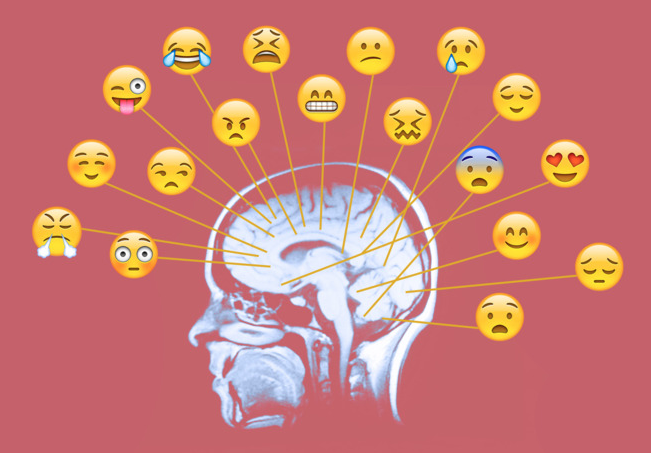Vegetable. Vegetable vegetable vegetable vegetable vegetable.
蔬菜。蔬菜,蔬菜,蔬菜,蔬菜,蔬菜,蔬菜,蔬菜。
Don't worry, I'm not trying to brainwash you into eating your veggies or anything.
别担心,我不是想给你洗脑,让你吃蔬菜什么的。
I'm trying to induce semantic satiation: that thing where if you repeat something enough times, it starts to lose all meaning.
我在试着去诱导语义饱和:如果你重复某件东西的次数足够多,就会失去东西的全部意义。
Sure, maybe that's not the most productive way to spend my time — but!
当然,也许这不是最有效的消磨时间的方式——但是!
This effect can tell you a whole lot about how your brain reacts when you ask it to process the same thing over and over and over and over…
当你要求大脑反复处理同一件事情时,此效应可以告诉你很多关于大脑如何反应的信息......
Semantic satiation was first reported in academic literature in the early 1900s by British psychologist
20世纪初,英国心理学家首次在学术文献中提出语义饱和
Edward Titchener. He described losing the meaning of a word as puzzling and a morsel frightening, which is a very 1900s way of putting it,
爱德华·蒂奇纳把失去一个单词的意思描述为令人困惑和害怕,这是20世纪的一种说法,
but is also pretty accurate. It is kind of scary when a word you use all the time suddenly seems foreign and strange.
但也颇为准确。当一个你经常使用的单词突然变得陌生时,你会觉得有点害怕。
Soon, psychologists started studying the effect through case studies and smaller experiments.
不久,心理学家开始通过案例和较小的实验来研究这种效应。
But it wasn't until more recently that we really started to get an idea of what causes it.
但直到最近,我们才真正开始了解它的成因。
So, why does the meaning of repeated words just ... slip right out of your head?
那么,为什么重复单词,而单词的意思会从你脑子里溜走?
Well, every time you say the word "vegetable", you activate the associated node –
每次说“蔬菜”这个词,相关的节点——
the area of your brain responsible for storing the concept of what a vegetable is.
大脑中负责储存蔬菜概念的区域就会被激活。
And when you repeat the word, you activate the node again and again.
当你重复这个词的时候,你会一次又一次的激活这个节点。
Asking that node to activate so many times in just a few seconds is kind of like asking your brain to sprint really hard and just...keep… going.
几秒钟内那个节点被多次激活就像让你的大脑拼命冲刺……保持……。
It might start off well, but after a while the node gets fatigued,
一开始可能很好,但过了一段时间节点就会疲劳,
and every activation that you force by saying the word vegetable yet again is that much harder to make happen.
每次说出“蔬菜”这个词,激活都很难实现。
When a node gets tired like that, it's called reactive inhibition, and that's where the "satiation" in semantic satiation comes from.
当一个节点累了,我们称之为反应性抑制,这就是语义饱和中“饱和”的来源。
While that node is inhibited, you can't use it to draw meaning out of the word "vegetable" until it recovers.
当这个节点被抑制,你无法用其提取“蔬菜”这个词的意思,直至节点恢复。
Even weirder, because of this node arrangement, when you satiate one word,
更奇怪的是,由于这个节点的排列,当你饱和重复一个单词,
it can also become harder to draw meaning from other related words and concepts.
从其他相关的单词和概念中提取意思也会变得更加困难。
A great example of this comes from research published back in 1990:
一个典型例子是1990年发表的研究:
Participants were asked to satiate a word that represented a category, like the word "furniture", by repeating it 30 times.
参与者被要求重复一个代表类别的词30次,比如“家具”。

Then they were presented with two related words, like "chair" and "table",
然后是两个相关的词,如“椅子”和“桌子”,
and asked to identify whether the words belonged to the same category as each other.
并确定这些词是否属于同一类别。
Even though they weren't directly analyzing the word "furniture",
尽管他们没有直接分析“家具”这个词,
subjects who'd repeated it 30 times were slower to identify whether or not the two words were related
重复30次后,受试者判断这两个词是否相关的速度就会变慢
— probably because they had a harder time accessing the meaning of things related to furniture.
——可能是因为他们很难理解与家具相关事物的含义。
People in the control group, who only repeated "furniture" 3 times, didn't have those problems.
对照组只重复“家具”三次,没有出现这些问题。
Their furniture node wasn't tired out, so they could access the meanings of related words just fine.
他们的“家具”节点并没有累坏,所以他们可以很好地获取相关单词的含义。
So if you repeat the word "vegetable" enough times, you might also have trouble processing the word "carrot" or "pepper".
因此,如果你重复“蔬菜”这个词的次数足够多,你可能在处理“胡萝卜”或“胡椒”时有困难。
But satiation can affect more than just words.
但饱和不仅仅影响语言。
Other studies have shown that satiating emotional words,
其他研究表明,饱和重复一些感情词,
like "happiness" or "anger" can impair your ability to recognize those emotions in facial expressions for a while.
比如“快乐”或“愤怒”,一段时间内会削弱你在面部表情中识别这些情绪的能力。
In one study from 2012, for example, 60 college students looked at a set of faces until they were familiar with them.
例如,在2012年的一项研究中,60名大学生看着一组面孔,直至熟悉为止。
Then they were divided into a control and an experimental group.
然后将它们分成对照组和实验组。
At the beginning of each trial, they were asked to repeat the word for an emotion, like "happiness".
每次试验开始的时候,他们都被要求重复“快乐”这个词。
The control group only repeated the word 3 times, but the experimental group repeated it 30 times,
对照组只重复单词3次,实验组重复单词30次,
taking them firmly into semantic satiation territory.
将它们稳稳地进入语义饱和状态。
Both groups were then shown a face displaying that emotion —
然后,给两组人展示表情
so if they'd been repeating the word "happiness", the researchers would show them a happy face.
所以如果他们一直重复“快乐”这个词,研究人员就会给他们看一张快乐的脸。
After a pause, they'd show them two versions of that happy face. One would be slightly happy, and one would be very happy.
停了一会儿,研究人员给他们看两张不同的笑脸,一个人有点快乐,一个人很快乐。
Think a "Huh, I look great today" face versus an "Oh my gosh, we're getting a puppy?!" face.
想想看,一张“哈,我今天看起来棒极了”的脸,另一张“天哪,我们要养只小狗了?!”的脸。
One of those two pictures matched the first one the subjects saw, and they had to identify the matching one.
这两张图片中的其中一张与实验看到的第一张相匹配,他们必须识别出相匹配的那张。
And the experimental group who'd repeated emotional words 30 times took longer to identify the matching picture.
而实验组重复了30次感情词的人识别匹配图片的时间更长。
Repeating words like "happiness", "fear", and "anger" made it harder for them to access the entire concept of that emotion—
重复像“快乐”、“恐惧”和“愤怒”这样的词会让他们理解那种情绪概念——
including what it looks like as a facial expression.
包括面部表情更加困难。
So, the next time you're trying to cram for a quiz by repeating all those new words you've gotta learn, just remember that your brain has limits.
所以,下次你想死记硬背那些你必须学习的新单词时,记住你的大脑是有极限的。
Maybe let it take a breather in between rehearsing words over and over and over and over.
不妨在一遍又一遍记单词中间休息一下。
And if the word "vegetable" is starting to sound as weird to you as it is to me, well… at least our brains are getting confused together.
如果“蔬菜”这个词对你和对我来说听起来都很奇怪,那么……至少我们的大脑开始糊涂了。
Thanks for watching this episode of Scishow Psych, and a big thank you to our patrons on Patreon who made it possible.
感谢收看本集心理科学秀,感谢Patreon为我们的节目提供赞助。
If you liked it, feel free to give us a thumbs up, and if you want to keep exploring psychology with us, hit that subscribe button. Until next time!
如果你喜欢我们的节目,请给我们点赞,如果你想和我们一起探索心理学,点击订阅按钮。我们下次再见!











